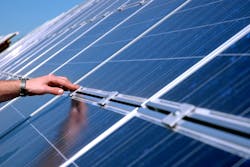President Donald Trump has approved recommendations that will impose tariffs on foreign manufactured solar cells and modules. The U.S. International Trade Commission had issued recommendations at the end of October. The commissioners offered three different recommendations from as much as 35-percent tariff on all imported solar modules down to a four-year import quota system that allowed 8.9GW of solar modules and cells to be imported in the first year.
The President decided on the more intermediate recommendations, which called for 30% tariffs on solar modules and cells in year one, declining 5% annually to 15% in their fourth and final year. The tariffs exempt 2.5 GW per year of solar panels but do not exclude solar modules.
Suniva and SolarWorld Americas had petitioned the ITC for tariffs, saying that cheap imports were killing the American domestic panel manufacturing industry.
In response to Trump's approval, Juergen Stein, CEO and president of SolarWorld Americas Inc., said his company is still reviewing these remedies, and are hopeful they "will be enough to address the import surge and to rebuild solar manufacturing in the United States."
According to a New York Times report, Suniva called the International Trade Commission’s recommendations “disappointing," saying they were not strict enough. It called on Trump to implement more stringent restrictions “necessary to save American manufacturing.”
The Solar Energy Industries Association had a different reaction. In a Jan. 22 statement, it said that its members expressed disappointment in the decision to impose 30 percent tariffs on imported solar cells and panels. The decision effectively will cause the loss of roughly 23,000 American jobs this year, including many in manufacturing, and it will result in the delay or cancellation of billions of dollars in solar investments, the SEIA statement read.
“While tariffs in this case will not create adequate cell or module manufacturing to meet U.S. demand, or keep foreign-owned Suniva and SolarWorld afloat, they will create a crisis in a part of our economy that has been thriving, which will ultimately cost tens of thousands of hard-working, blue-collar Americans their jobs,” said Abigail Ross Hopper, SEIA’s President and CEO.
The impact of the decision will be far-reaching across all sectors of the solar economy, SEIA members said.
SEIA estimates that a tariff at this level will eliminate, not add to, American manufacturing jobs. There were 38,000 jobs in solar manufacturing in the U.S. at the end of 2016, and all but 2,000 made something other than cells and panels, the subject of this case. Those 36,000 Americans manufactured metal racking systems, high-tech inverters, machines that improved solar panel output by tracking the sun and other electrical products.
A commentary published by Bloomberg contended that the tariffs would not be that big of a deal. "The solar revolution is happening so fast that the tariff will make little difference."
About the Author
Nikki Chandler
Group Editorial Director, Energy
Nikki is Group Editorial Director of the Endeavor Business Media Energy group that includes T&D World, EnergyTech and Microgrid Knowledge media brands. She has 29 years of experience as an award-winning business-to-business editor, with 24 years of it covering the electric utility industry. She started out as an editorial intern with T&D World while finishing her degree, then joined Mobile Radio Technology and RF Design magazines. She returned to T&D World as an online editor in 2002. She has contributed to several publications over the past 25 years, including Waste Age, Wireless Review, Power Electronics Technology, and Arkansas Times. She graduated Phi Beta Kappa with a B.S. in journalism from the University of Kansas.

